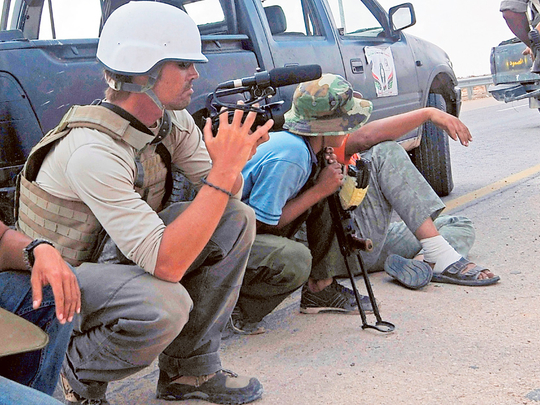
Rochester, New Hampshire: Journalist James Foley, captured and held six weeks while covering the uprising in Libya, knew the risks when he went to Syria in 2012 to cover the escalating violence there. It didn’t matter. He was a journalist at heart, once saying he’d cover local news if it meant doing the job he loved.
Foley was snatched again in Syria in November 2012 when the car he was riding in was stopped by four militants in a battle zone that Sunni rebel fighters and government forces were trying to control.
Foley’s family confirmed his death on a webpage created to rally support for him. His mother, Diane Foley, said in a statement on the webpage he “gave his life trying to expose the world to the suffering of the Syrian people.”
At Foley’s family home in Rochester, a light burned yellow in a centre upstairs window and a yellow ribbon adorned a tree at the foot of the driveway. The Reverend Paul Gousse, of Our Lady of the Holy Rosary, where the Foleys are parishioners, spent about 45 minutes at the house but left without commenting.
Foley, 40, worked in a number of conflict zones in the Middle East, including Syria, Libya and Iraq. He and another journalist were working in the northern province of Idlib in Syria when they were kidnapped near the village of Taftanaz.
After Foley disappeared, while contributing video for Agence France-Presse and the media company GlobalPost, his parents became fierce advocates for him and all those kidnapped in war zones. They held regular prayer vigils and worked with the U.S. and Syrian diplomatic corps to get whatever scraps of information they could.
Diane Foley, asked in January 2013 if her son had reservations about going to Syria, said softly: “Not enough.”
Foley also covered the war in Afghanistan but called the Libyan fighting the worst he had ever experienced to that point.
Foley grew up in New Hampshire and studied history at Marquette University. He later taught in Arizona, Massachusetts and Chicago before switching careers to become a journalist, which he viewed as a calling.
“Journalism is journalism,” Foley said. “If I had a choice to do Nashua (New Hampshire) zoning meetings or give up journalism, I’ll do it. I love writing and reporting.”












